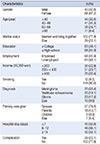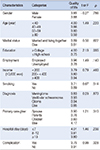Abstract
Purpose
This study evaluated the levels of self-care agency and quality of life and identified the effect of self-care agency on quality of life in brain tumor patients who had undergone surgical resection of brain tumors.
Methods
Data were collected from 131 patients who visited an outpatient clinic for postoperative regular check-ups. Self-care agency and quality of life were assessed via self-administered questionnaires. Data were analyzed with descriptive, univariate, and hierarchical regression analyses.
Results
The average scores for self-care agency and quality of life were 4.58 (possible range: 1~6) and 3.87 (possible range: 1~5) respectively. Social and thinking functions were the lowest among quality of life sub-scales. Education level was a significant correlate of quality of life in univariate analyses but not in multivariate analysis. Self-care agency accounted for 29.0% of the total variance in quality of life, controlling for education level.
Figures and Tables
Table 1
Characteristics of Participants (N=131)

Table 2
Levels of Self-care Agency and Quality of Life (N=131)

Table 3
Differences in Quality of Life by Characteristics (N=131)

Table 4
Correlations between Self-care Agency and Quality of Life (N =131)

Table 5
Factors Affecting Quality of Life (N =131)

References
1. Jung KW, Ha J, Lee SH, Won YJ, Yoo H. An updated nationwide epidemiology of primary brain tumors in republic of Korea. Brain Tumor Res Treat. 2013; 1(1):16–23.

2. Lee CH, Jung KW, Yoo H, Park S, Lee SH. Epidemiology of primary brain and central nervous system tumors in Korea. J Korean Neurosurg Soc. 2010; 48(2):145–152.

3. Rozmovits L, Khu KJ, Osman S, Gentili F, Guha A, Bernstein M. Information gaps for patients requiring craniotomy for benign brain lesion: a qualitative study. J Neurooncol. 2010; 96(2):241–247.

4. National Cancer Information Center. Web site Center. Accessed August 28, 2015. http://www.cancer.go.kr.
5. Taphoorn MJ, Sizoo EM, Bottomley A. Review on quality of life issues in patients with primary brain tumors. Oncologist. 2010; 15(6):618–626.

6. Kim CY, Chung HT, Lee SH, Kim DG, Jumg HW. Quality of life in patients with vestibular schwannoma after treatment: Short form-36 based study. J Korean Neurosurg Soc. 2003; 33:535–539.
7. Gustafsson M, Edvardsson T, Ahlström G. The relationship between function, quality of life and coping in patients with low-grade gliomas. Support Care Cancer. 2006; 14(12):1205–1212.

8. Mauer M, Stupp R, Taphoorn M, Coens C, Osoba D, Marosi C, et al. The prognostic value of health-related quality-of-life data in predicting survival in glioblastoma cancer patients: results from an international randomised phase III EORTC brain tumour and radiation oncology groups, and NCIC clinical trials group study. Br J Cancer. 2007; 97(3):302–307.

9. Cheng S, Naidoo Y, da Cruz M, Dexter M. Quality of life in postoperative vestibular schwannoma patients. Laryngoscope. 2009; 119(11):2252–2257.

10. Liu R, Page M, Solheim K, Fox S, Chang SM. Quality of life in adults with brain tumors: current knowledge and future directions. Neuro Oncol. 2009; 11(3):330–339.

11. Taphoorn MJ, Klein M. Cognitive deficits in adult patients with brain tumours. Lancet Neurol. 2004; 3(3):159–168.

12. Jung Y. The relationship between self-care agency and quality of life of cancer patients. J Korean Acad Adult Nurs. 1993; 5(2):188–201.
13. Lee M. Relationships between self-care agency and quality of life of head and neck cancer patients following surgery [master's thesis]. Seoul: Ehwa Univ.;2004.
14. So HS. Testing constuct validity of self-as-carer inventory and its predictors. J Korean Acad Adult Nurs. 1992; 4(2):147–161.
15. Eo YS. Effects of an Empowerment Program on the Burden of Mothers Having a Child with Cerebral Palsy. J Korean Acad Nurs. 2005; 35(1):154–164.

16. Park SY, Nam YW, Baek MW. The relationships among self-care agency, family support, quality of life in patients with rheumatoid arthritis. J Muscle Joint Health. 2000; 7(2):281–293.
17. Kim HS. Development and evaluation of self-care agency promoting programme for prostatectomy patients. Int J Urol Nurs. 2011; 5(1):34–44.

18. Geden E, Taylor S. Construct and empirical validity of the Self-As-Carer Inventory. Nurs Res. 1991; 40(1):47–50.

19. Williams LS, Weinberger M, Harris LE, Clark DO, Biller J. Development of a stroke-specific quality of life scale. Stroke. 1999; 30(7):1362–1369.

20. Moon J. A study on the factors affecting stroke quality of life; using the Stroke-Specific Quality of Life [master's thesis]. Daegu: Daegu Univ.;2004.
21. Kim MY, Kim KS. Quality of life and the related factors in cerebrovascular surgery patients. Korean J Rehabil Nurs. 2005; 8(1):5–12.




 PDF
PDF ePub
ePub Citation
Citation Print
Print


 XML Download
XML Download